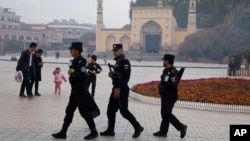Nobody knows what happened to a Uyghur student after he returned to China from Egypt and was taken away by police. Not his neighbors, not his classmates, not even his mother.
“Is he dead or alive?” the mother asked when an Associated Press reporter visited her home and showed her a photo of her son. Tears ran down her face.
Friends of the student believe that he is one of thousands of people who have been taken away without trial into new “re-education centers.”
The disappearances began in the past year. They are part of efforts by Chinese officials to use detentions and electronic surveillance to create a police state over the Xinjiang area and its 10 million Uyghurs.
Uyghurs are a Turkic-speaking, mostly Muslim minority. The Chinese government says Uyghurs have been influenced by Islamic extremism.
Police are everywhere in Xinjiang. High-tech surveillance systems track where Uyghurs go, what they read, who they talk to and what they say.
Through rare interviews with Uyghurs who recently left China, government reports, and a visit to southern Xinjiang, the Associated Press reported on a campaign that is meant to remove terror, but is instead causing fear.
Most of the more than a dozen Uyghurs the AP interviewed asked to be unnamed because they feared that Chinese officials would punish them or their family. The AP did not name the Uyghur student or report other personal information in order to protect people from possible punishment.
“Strike hard” campaign
The Xinjiang government did not answer repeated requests for comment from the AP. The national government describes its Xinjiang security measures as a “strike hard” campaign. They say its actions are necessary, following a series of attacks in 2013 and 2014. Among them was a mass knife attack at a train station that killed 33 people.
An official from the city of Hotan told the AP, “If we don’t do this, it will be like several years ago - hundreds will die.”
The Chinese government also notes its years of heavy economic investment in Xinjiang, cultural assimilation programs, and preferred college acceptance for Uyghurs.
Officials describe the mass detention programs as “vocational training.” The training centers on “Mandarin, law, ethnic unity, de-radicalization, (and) patriotism.” The programs can last from three months to two years.
The AP visited one such center in the southern city of Korla. A sign on the center called it a jail. Another one was along a street blocked off by police.
Southern Xinjiang is one of the most heavily policed places in the world. In Hotan, police stations are set up every 500 meters. Sometimes, groups of more than 40 armored police cars drive down city streets. Police checkpoints on every other city block stop cars to check identification. Police also check citizens’ smartphones for religious materials.
But much of the policing goes unseen.
Shoppers who enter the huge Hotan market must pass through metal detectors and place their national identification cards on a machine while their faces are scanned.
Police stopped AP reporters outside a hotel in Hotan. The officers said the public security office had been following the reporters’ movements by watching surveillance camera videos.
One government program appears to have three-dimensional pictures, voice data, genetic material and fingerprints, according to a public security document. The document’s full contents remain a secret. However, the AP found at least three contracts that made note of purchase orders for equipment such as microphones and voice analyzers.
China has also used common surveillance methods, such as recruiting people to do the work of spying. A Uyghur businessman from Kashgar who fled China said his four brothers and father were in prison because of his escape. He said that families that were made to spy on one another in his community had also been punished. Members from each family were sent to re-education centers for three months, he told the AP.
Uyghurs now living in other countries say it is too risky to contact their families still in China.
When Salih Hudayar, an American Uyghur graduate student, last called his grandfather this summer, the man told him kindly not to call again. He later heard his grandfather had been sent to a re-education camp.
A Uyghur student who moved to Washington said that after his move, his wife -- a government worker still in Xinjiang -- sent him a message that said the police would show up at her home in 20 minutes. She had to say goodbye. After that, she would permanently remove him from her contacts list.
Later, he couldn’t help but make one last call to his home. His daughter answered the phone.
“Mom is sick but she doesn’t want me to speak to you," she told him. "Goodbye."
Gerry Shih from the Associated Press reported this story. It was adapted by VOA Learning English. Hai Do was the editor.
_________________________________________________________________
Words in This Story
surveillance - n. the act of carefully watching someone or something especially in order to prevent or detect a crime
interview - v. to question or talk with (someone) in order to get information or learn about that person
assimilation - n. the process of causing a person to belong to a different society, group, etc.
vocational - adj. relating to the special skills, training, etc., that you need for a particular job or occupation
scan - v. to look at all parts of (something) carefully in order to find some feature.
block - v. to be placed in front of (something, such as a road or path) so that people or things cannot pass through
analyzer - n. something that studies something closely and carefully
recruit - v. to persuade (someone) to join you in some activity or to help you









